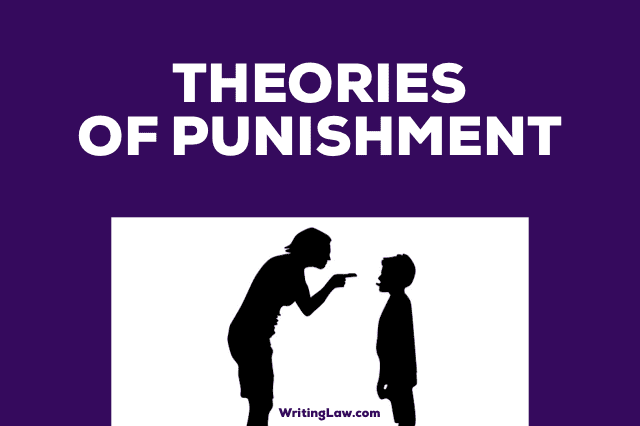This punishment will be the result of a guilty verdict in a court of law. Why Do We Punish.

Crime Prevention Criminal Justice Module 2 Key Issues 2a Detailed Explanation Of Tonry And Farrington S Typology
Theories of Criminal Law.

. Rehabilitation R ehabilitation seeks to prevent future crime by altering a criminals behavior. This entry begins by identifying features of criminal law that make this so 1. It then asks what functions that body of law fulfills 2 and what justifies its creation and continued.
Criminal penalties have the potential to achieve these crime-control effects through at least five causal mechanisms. Deterrence is designed to deter those who witness infliction of pain upon the convicted from committing crimes themselves. Preventing future criminal acts describes deterrence.
Most crime laws are set down by federal state and local government legislatures. Criminal penalties to prevent or lessen the seriousness of future criminal acts by the offender being sentenced andor by other would-be offenders. If the punishment does not prevent future crime than it simply adds to the suffering of a society.
Utilitarians such as Bentham and Beccaria the only purpose of punishment was to prevent or deter future crime. Banks Criminal Justice Ethics. The most extreme form of incapacitating punishment is the death penalty but there are several other forms including imprisonment curfews house arrest electronic monitoring and disqualification from driving for drunken drivers.
Incapacitation or preventing crime by keeping people in prison or jail is also a. Nagin succinctly summarized the current state of theory and empirical knowledge about deterrence. In his 2013 essay Deterrence in the Twenty-First Century Daniel S.
Other penalties are exacted with cruel or malignant intentions. Deterrence punishments are meant to discourage someone from committing crimes. 22 The beneficial effects of punishment are usually said to include the recognition that the victim has suffered an unjust act and that what has occurred is neither a mere accident the product of bad luck nor the.
Not all criminal cases end in a guilty verdict. Deterrence the crime prevention effects of the threat of punishment is a theory of choice in which individuals balance the benefits and costs of crime. Since the early 20th century basic education of criminal justice personnel has primarily focused on developing the skills necessary to be effective in the.
Any theory of criminal law must explain why criminal law is distinctivewhy it is a body of law worthy of separate attention. Some of the most common forms of punishment that are used to prevent crime include capital punishment corporal punishment incarceration probation intensive supervision community service and work programs fines restitution to the victims and forced participation in treatment programs. Preventing future criminal acts describes which purpose of punishment.
Punishment can also prevent crime by means of more diffuse processes that depend on internalized values rather than fear of punishment. Criminal penalties to prevent or lessen the seriousness of future criminal acts by the offender being sentenced andor by other would-be offenders. Theories of deterrence retribution just deserts rehabilitation and incapacitation as well as the idea of restorative justice will be considered in this chapter.
Deterrence is an act of discouraging the action or. It prevents future crime by disabling or restricting the offenders liberty their movements or ability to commit a further wrong. The purpose of punishment is to allocate moral blame to the offender for the crime and that his or her future conduct is not a proper concern for deciding punishment Hudson 1996.
Whereas retribution theorists focus on past events utilitarians and deterrence theorists focused on future issues. Some authors have argued that the purpose of punishment is to give satisfaction to the victim in the sense that it makes the victim feel better. It is meant to scare warn and persuade you to choose a different path.
Many people have strong views on punishment which influence the behaviors and decision of criminal administrators politicians and officers. Rehabilitation as Prevention Rehabilitation is preventing crime by changing the personality of the offender so that he will conform to the dictate of law Herbert Packer Medical Model of Criminal Law - crime is disease offenders are sick Purpose of punishment is to treat criminals Incarceration as rehabilitation length depends on how long it takes to cure the offender. Retribution is a common justification for tough sentences.
Punishment is not so much about if an individual. General deterrence refers to the impact on members of the public who become less likely to commit a crime after learning of the punishment another person experienced. Seeks retribution from offender and focused on past actions of offender.
While some purposes of punishment are aimed at benefiting society others are just aimed at exacting revenge upon an individual who is responsible for harm and destruction. Some criminal punishments are imposed with good intentions and hope for the convicts future. Through denunciation also referred to as the communicative educative or expressive function of punishment or as positive general prevention criminal penalties serve to define and reinforce important social norms of.
Criminal penalties have the potential to achieve these crime-control effects through at least five causal mechanisms. Punishment has been meted out for a variety of reasons. 2017 SAGE Publications.
If the rewards of the crime outweigh the punishment then they do the prohibited act. Set the goal of punishment as prevention of future crime deterrence. Sometimes criminologists borrow the phrase cost-benefit analysis from economists to describe this sort of.
When such conduct is caught the arrested person is forced to either pay fines or face imprisonment depending on the situation. This typically includes offering a host of programs while in prison including educational and. The philosophy of punishment is a part of the criminal justice culture and society.
If the punishment is seen as outweighing the rewards then they do not do it.

8 Kinds And Theories Of Punishment 2022


0 Comments